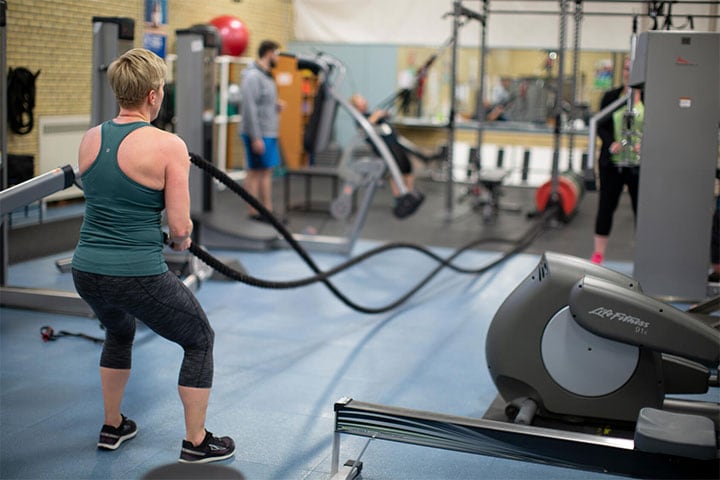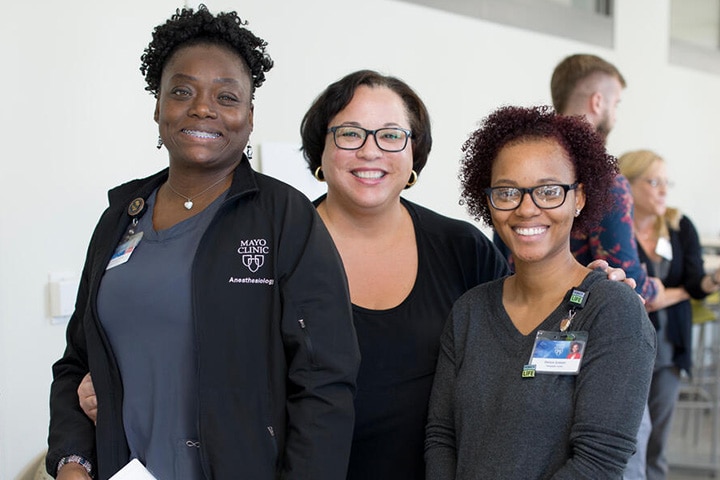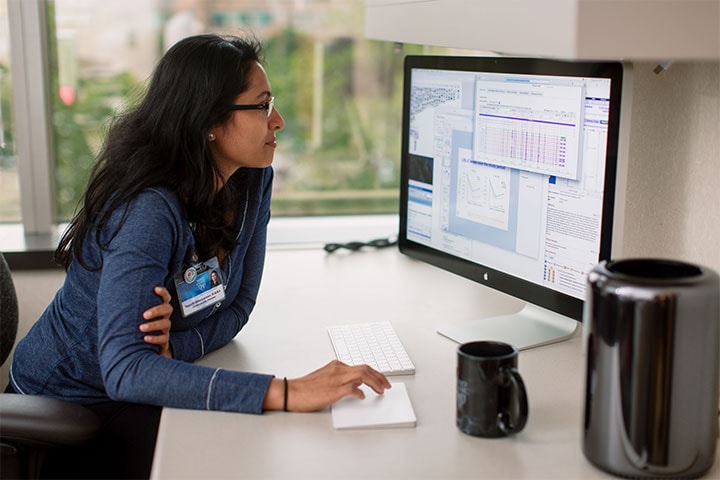Overview
The Department of Otolaryngology – Head and Neck Surgery at Mayo Clinic in Arizona is offering a two-year Rhinology and Skull Base Surgery Fellowship for international candidates under the mentorship of Drs. Devyani Lal, Michael Marino, and Amar Miglani. This fellowship has been formulated to offer training in the comprehensive treatment of inflammatory sinonasal conditions, anterior skull base surgery, orbital pathology, functional nasal surgery, epistaxis, and allergy. Our aim is to prepare graduates for academic careers internationally.
Program history
Program history
The Rhinology and Skull Base Surgery Fellowship at Mayo Clinic in Arizona was established in 2023. One fellow will be appointed to the fellowship every other year.
Application process
Positions
The Rhinology and Skull Base Surgery Fellowship at Mayo Clinic in Phoenix, Arizona, accepts one fellow every other year on a competitive basis.
Qualifications
Applicants for the Rhinology and Skull Base Surgery Fellowship program must have completed residency training in their country of origin, completed ECFMG requirements (including passing USMLE and TOEFL) and possess the ability to obtain a J1 VISA.
Also see admissions to Mayo Clinic School of Graduate Medical Education.
How to apply
Contact Cindy McCullough, education program coordinator, prior to accessing the online application system. Instructions will be given as to what documentation will be needed for review.
If an application is needed, you need to use the third-party application service, Recruit. No matching program services are used.
To apply, you'll complete the following steps:
- Create an account to begin the online Application for Admission
- All applications to Mayo Clinic School of Graduate Medical Education programs must include these application materials
- After submission, view the required Supplemental Items and Documents
-
- Upload each required item in the Supplemental Items section (if applicable)
- Complete the Recommendation Request section (if applicable)
Applicants considered for an appointment will be invited for a personal interview with the program director and selected faculty.
Interviews are conducted on a rolling basis.
Curriculum
Curriculum overview
You will receive comprehensive training in medical and surgical management of rhinologic conditions including the following:
- Basic and complex revision endoscopic sinus surgery
- Extended endoscopic sinus surgery procedures (for example, Draf 2a, Draf 3, sphenoid sinus drill out)
- Endoscopic endonasal orbital surgery (e.g. tumors and decompression)
- Lacrimal surgery (for example, DCR)
- Endoscopic transsphenoidal approaches to the sella and parasellar regions
- Endoscopic anterior skull base resection
- Open approaches to sinonasal tumors
- Endoscopic transclival and craniovertebral junction approaches
- Functional nasal surgery including caudal end management, nasal septal perforation repair, and lateral nasal wall reconstruction
In addition to your clinical experiences, you participate in clinical research during the fellowship
Clinical training, didactic training, research training, call frequency
Clinical training
You will participate in all aspects of patient care and be expected to function independently in routine surgical cases, including preoperative and postoperative care of the patient.
Didactic training
You will participate in the departmental conferences, seminars, journal club and multidisciplinary conferences throughout the academic year. You will also coordinate and present at resident conferences.
Research training
You are encouraged to participate in ongoing or new research projects and will be expected to present at regional and national meetings. You will also be encouraged to participate in manuscripts for publication in peer reviewed journals.
Call frequency
You will take call from home on a rotating basis with the residents and physician assistants in the department.
Career development, moonlighting policy, evaluation
Career development
You will meet periodically with program director to discuss individual goals and provide ongoing support for future career development.
Moonlighting policy
Moonlighting is not permitted during this fellowship.
Evaluation
To ensure that you acquire adequate knowledge and develop your technical skills, your performance will be monitored carefully during the course of your program training. You will be evaluated formally by your supervising faculty member after each clinical rotation and will meet with the program director to review these evaluations.
Belonging
At Mayo Clinic, we foster an inclusive working environment and embrace the diversity of all our trainees, faculty, staff, and patients. Our Office of Belonging offers tremendous resources to support our mission of maintaining a welcoming atmosphere for all our employees, including our learners. We strive to provide culturally appropriate care and do our part to reduce healthcare disparities.
/0x0:512x512/prod01/channel_2/media/studio-sites/mccms-reference-guide/512X5121573348_3801872_0024-(1).jpg)
Video: See yourself at Mayo Clinic
5:33
Department and faculty
The Department of Otolaryngology Head and Neck Surgery at Mayo Clinic in Arizona, includes a diverse group of specialists in the field of otolaryngology, head and neck surgery. The department currently handles more than 16,000 patient visits per year and performs approximately 1,800 procedures. The department performs all of its own reconstructive surgery.
The department includes experts in:
- Otology/neurotology
- Audiology
- Head and neck cancer surgery
- Microvascular reconstructive surgery
- Facial plastic and reconstructive surgery
- Laryngology
- Rhinology
- General otolaryngology
- Medical otolaryngology
- Oral-maxillo facial surgery and traumatology
Department members collaborate with other specialists in audiology, speech and swallowing therapy, ophthalmology, pediatrics, neurosurgery, dermatology, allergy and immunology, pulmonary medicine, and oncology. Through this collaboration, the department offers comprehensive and excellent care for patients with disorders involving the head and neck.
In addition to caring for patients in their clinical practices, Mayo Clinic's faculty members are committed to teaching and facilitating the growth of medical knowledge. Many faculty members have published and lectured extensively and are well regarded in their field. You will have direct access to these individuals throughout your training program.
Visiting professors/lecturers
The department invites two or three prominent guest lecturers each year to present. Guest professors also are frequently invited to participate in departmental courses.
Wellness initiatives
As a trainee, your physical and mental health are priorities to Mayo Clinic and the department. Trainees have access to several resources to promote well-being, as well as time off clinical duties to attend appointments.
- Fitness centers
- Groups on campus
- Well-being
Fitness centers
 As a resident or fellow at Mayo Clinic in Arizona, you have access to an exclusive learners-only gym and wellness center conveniently located in Phoenix. Additionally, Mayo Clinic residents or fellows at our three campuses get discounted membership fees to area gyms through PerkSpot, the Mayo Clinic employee discount program.
As a resident or fellow at Mayo Clinic in Arizona, you have access to an exclusive learners-only gym and wellness center conveniently located in Phoenix. Additionally, Mayo Clinic residents or fellows at our three campuses get discounted membership fees to area gyms through PerkSpot, the Mayo Clinic employee discount program.
All Mayo employees, including Arizona learners, can also sign up to take live virtual fitness classes or view recorded fitness classes offered by the Dan Abraham Healthy Living Center (DAHLC).
Groups on campus
 Opportunities to join a variety of groups on campus provide regular social activities and can help enhance your training while connecting with a broad group of peers.
Opportunities to join a variety of groups on campus provide regular social activities and can help enhance your training while connecting with a broad group of peers.
Trainees have the opportunity to join a Mayo Employee Resource Group (MERG) at any time during their training program. MERGs are employee-led affinity groups to promote belonging, increase cultural awareness, and foster an environment of respect and inclusivity. Any Mayo Clinic employee can join a group of interest and choose their level of involvement.
Well-being
 The Office of Academic Support and Well-Being provides resources to promote academic, emotional, social, cognitive, financial, and physical well-being. Career and academic services include academic advising, peer tutoring, and accommodations for learners with disabilities or health conditions. Mental health services, counseling, interview practice, and a variety of enrichment sessions on topics like budgeting, resiliency, and stress and burn-out are also available through the Academic Support and Well-Being office.
The Office of Academic Support and Well-Being provides resources to promote academic, emotional, social, cognitive, financial, and physical well-being. Career and academic services include academic advising, peer tutoring, and accommodations for learners with disabilities or health conditions. Mental health services, counseling, interview practice, and a variety of enrichment sessions on topics like budgeting, resiliency, and stress and burn-out are also available through the Academic Support and Well-Being office.
More from Mayo Clinic School of Graduate Medical Education
/0x0:512x512/prod01/channel_2/media/mccms/content-assets/academics/residencies-and-fellowships/3319834_0363-512X512.jpg)
Choosing Mayo Clinic
/0x0:512x512/prod01/channel_2/media/mccms/content-assets/shared-documents/campus-AZ-3180811-0001-pic-tile.jpg)
Phoenix/Scottsdale, AZ
Campus and community
/0x0:512x512/prod01/channel_2/media/studio-sites/mccms-reference-guide/512X5121676671_3824027_0010_C.jpg)
Stipend and benefits
Mayo Fellows Association (MFA)
The Mayo Fellows Association (MFA) offers a peer and social support network for residents and fellows and their families with social events, athletics, and advocacy. The MFA also holds an annual resident and fellow appreciation event open to all trainees with complimentary massages, stress-reducing activities, and social support.
/0x0:440x220/prod01/channel_2/media/mccms/content-assets/campus-amp-community/arizona/440X220_sidebar-mayo-clinic-phoenix-arizona-is453080663.jpg)